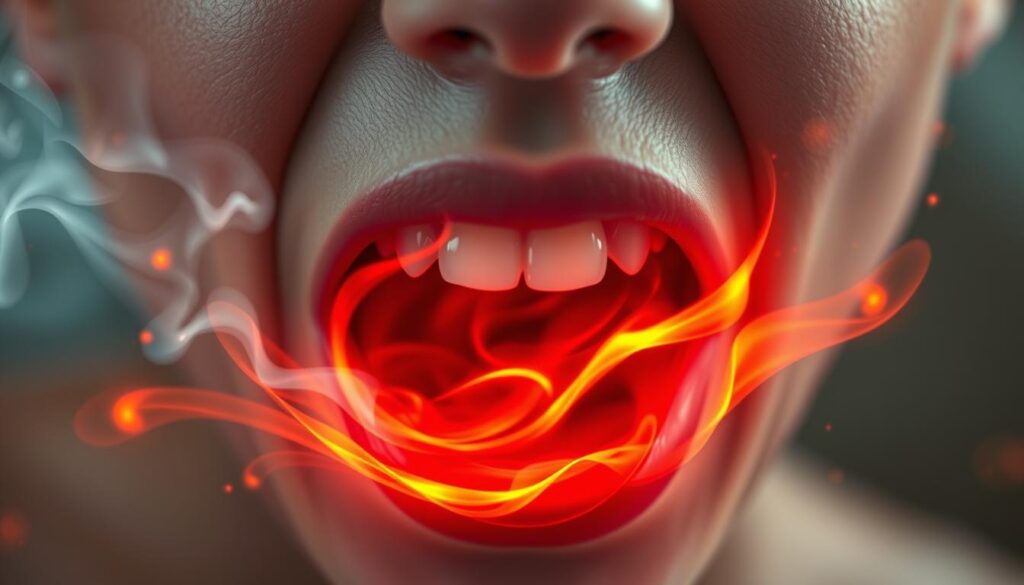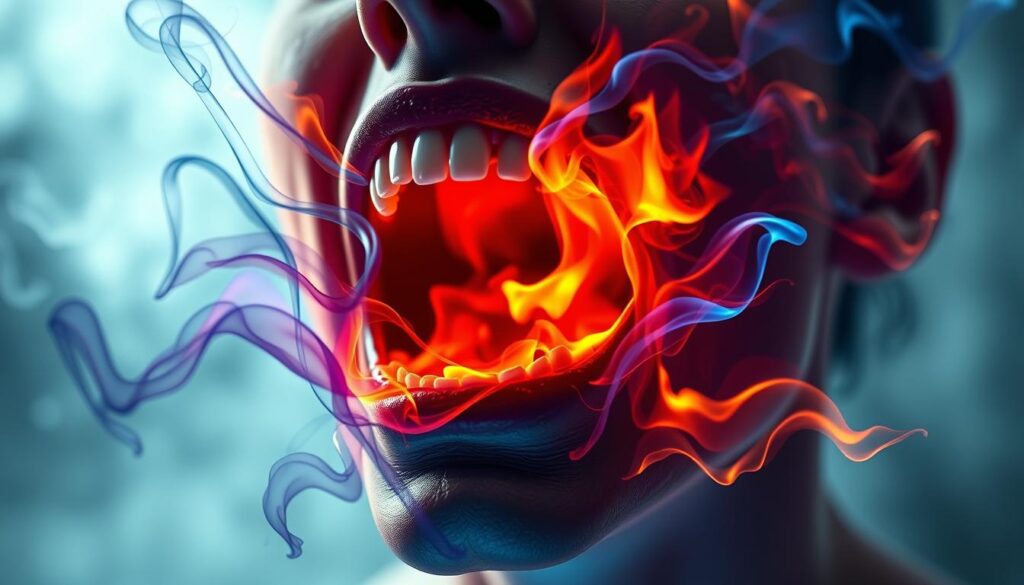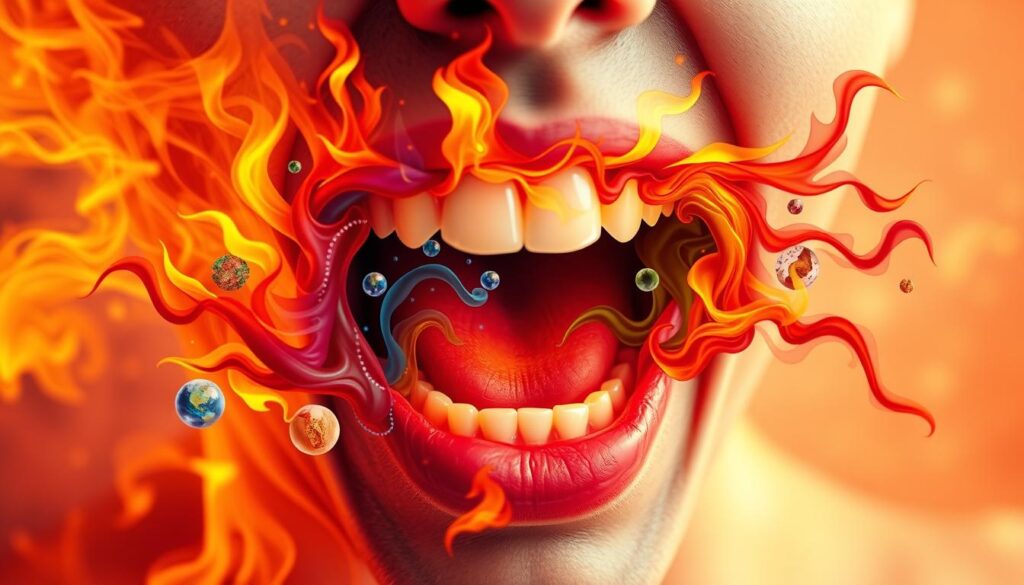Did you know that up to 15% of people worldwide may deal with burning mouth syndrome (BMS)? This condition, also known as oral dysaesthesiae, causes a constant burning feeling in the mouth, tongue, or lips. It affects people of all ages and backgrounds.
Burning mouth syndrome can really hurt your daily life. It makes eating, drinking, and even talking hard. Knowing what causes it, its symptoms, and how to treat it is key for those looking for relief.

Key Takeaways
- Burning mouth syndrome (BMS) is a chronic condition characterized by a persistent burning sensation in the mouth, tongue, or lips.
- BMS affects up to 15% of the global population, with women more commonly affected than men.
- The causes of BMS can be complex, often involving a combination of neurological, hormonal, and psychological factors.
- Symptoms of BMS can significantly impact a person’s quality of life, making everyday tasks like eating and speaking difficult.
- Effective management of BMS may involve a combination of medical treatments, lifestyle modifications, and self-care practices.
Understanding Burning Mouth Syndrome: An Overview
Burning mouth syndrome, also known as oral dysaesthesiae, is a complex condition. It affects many people. It causes a burning sensation in the mouth, along with dry mouth and taste changes.
Common Symptoms and Warning Signs
The main symptom is a burning or tingling feeling in the mouth. This often happens in the tongue, lips, gums, or the whole mouth. People may also feel their mouth is dry and taste things differently.
These feelings can get worse as the day goes on.
Who Is Most Affected by BMS
Women, especially during menopause, are more likely to have burning mouth syndrome. It can happen to anyone, but it’s less common in the young. Hormonal changes, neurological issues, and other health problems can lead to it.
Impact on Daily Life
Burning mouth syndrome can really affect someone’s life. It makes eating, drinking, and talking hard. The constant pain can also lead to anxiety, depression, and feeling isolated.
Understanding burning mouth syndrome is key. It helps people manage their symptoms and find the right treatment.
The Science Behind Burning Mouth (Oral Dysaesthesiae)
Burning mouth syndrome, also known as oral dysaesthesiae, is a complex condition. It involves neuropathic pain and sensory disturbances in the oral cavity. Research has made progress in understanding the neurological and physiological factors behind it.
One theory is that burning mouth syndrome is linked to impaired nerve function and altered pain perception. Studies show that people with this condition might have trouble processing sensory information. This is due to issues with the trigeminal nerve, which sends signals from the mouth to the brain.
Researchers also look at local inflammatory processes and vascular changes in the mouth. They think these might cause the burning and discomfort. Changes in neurotransmitters like dopamine and serotonin are also being studied.
More research is needed to understand the complex factors behind burning mouth syndrome. As studies continue, we’ll learn more about this condition. This will help improve how we diagnose and treat it.
“The science behind burning mouth syndrome is an intriguing and rapidly evolving field of study, with researchers uncovering new insights into the intricate mechanisms underlying this perplexing condition.”

Primary vs. Secondary Burning Mouth Syndrome
Burning mouth syndrome (BMS) comes in two types: primary (idiopathic) BMS and secondary oral dysaesthesiae. Knowing the difference is key for the right diagnosis and treatment.
Distinguishing Between Different Types
Primary, or idiopathic, BMS has no known cause. People with this type feel a burning sensation in their mouth, tongue, lips, or palate. Yet, there’s no visible sign of anything wrong. The exact reason for primary BMS is still a mystery, but it might involve the brain and nerves.
On the other hand, secondary oral dysaesthesiae happens when a burning mouth is a symptom of another health issue. This can include hormonal problems, neurological disorders, autoimmune diseases, and some medications or infections.
Risk Factors and Triggers
- Primary (idiopathic) BMS is more common in older adults, especially postmenopausal women. It can affect anyone, though.
- Secondary oral dysaesthesiae is often tied to health issues like diabetes, thyroid problems, or not getting enough nutrients.
- Stress, anxiety, and certain foods or drinks can make symptoms worse for both types of BMS.
Telling primary and secondary BMS apart is very important. The causes and how to treat them are different. A detailed medical check-up, including a full medical history and tests, is needed to find the best treatment.
Common Symptoms and Manifestations
Burning mouth syndrome (BMS) is a complex condition with various symptoms. A key sign is a tongue burning sensation, feeling hot or tingling. This discomfort can be mild or severe, affecting the tongue, lips, gums, or mouth.
People with BMS may also notice taste changes. They might taste something metallic, bitter, or unpleasant. This can make eating less enjoyable and affect their quality of life.
Xerostomia, or dry mouth, is another symptom. It can make speaking, swallowing, and wearing dentures hard. Some may feel numbness or tingling in their mouth.
The symptoms of BMS can vary a lot. Some people feel constant pain, while others have it off and on. Knowing the different ways BMS can show up is key to diagnosing and treating it.
“The burning sensation in my mouth is so intense, it feels like I’ve just taken a bite of something scalding hot. It’s a constant struggle to find relief.”
Medical Conditions Associated with Oral Dysaesthesiae
Burning mouth syndrome, also known as oral dysaesthesiae, is linked to many medical conditions. Knowing these connections helps find the root cause and treat it effectively. Let’s look at the main medical conditions tied to this condition.
Hormonal Imbalances and Menopause
Hormonal shifts, especially during menopause, can lead to burning mouth syndrome. Changes in estrogen and other hormones can cause nutritional deficiencies. This can trigger menopause symptoms like a burning mouth feeling.
Neurological Disorders
Neurological issues like peripheral neuropathy and trigeminal neuralgia can cause burning mouth syndrome. These problems affect the nerves in the mouth. This leads to feelings of burning, tingling, or numbness.
Autoimmune Conditions
Autoimmune diseases, such as Sjögren’s syndrome and diabetes, are also linked to burning mouth syndrome. These conditions can cause inflammation and change how we feel in the mouth.
It’s important for doctors to know about these connections. This way, they can give better treatment. By tackling the cause, people with oral dysaesthesiae can feel better and live better lives.

Diagnosis Methods and Clinical Evaluations
Diagnosing burning mouth syndrome (BMS) is complex. It often shows symptoms similar to other conditions. Doctors use oral examinations, blood tests, and psychological assessments to find the cause.
A doctor will first check the mouth for any signs of trouble. They might also test how the patient feels taste and touch. Blood tests help check for other health issues that could cause the symptoms.
Psychological assessments are also key. Doctors use tests and interviews to look at the patient’s mental health. This helps understand how stress and mental state affect the symptoms.
Even with these steps, some people with BMS find it hard to get a diagnosis. More research is needed to better understand and treat BMS.
| Diagnostic Method | Purpose |
|---|---|
| Oral Examination | Assess physical abnormalities or signs of inflammation in the oral cavity |
| Blood Tests | Identify potential underlying medical conditions, such as nutritional deficiencies or hormonal imbalances |
| Psychological Assessments | Evaluate mental health, stress levels, and overall well-being, which can influence burning mouth symptoms |
Diagnosing burning mouth syndrome is complex. Doctors look at many factors to find the cause. This approach helps them offer better treatments for those with this condition.
Treatment Options and Management Strategies
People with burning mouth syndrome (BMS) have many ways to feel better. They can try medicines, therapy, change their lifestyle, or use alternative treatments. These methods aim to ease pain and improve life quality.
Medications and Therapeutic Approaches
Medicines are often the first choice for BMS. Oral pain management drugs like antidepressants and anticonvulsants can lessen the burning. Topical anesthetics also help. Cognitive behavioral therapy (CBT) helps with the mental side of BMS. It teaches coping and stress management.
Lifestyle Modifications
- Avoid foods and drinks that can make burning worse, like spicy or acidic ones.
- Keep good oral hygiene with brushing, flossing, and a soft toothbrush.
- Drink lots of water to avoid dehydration, which can make mouth pain worse.
- Use stress-reducing activities like meditation or yoga to help with BMS symptoms.
Alternative Treatments
Some people find relief in alternative therapies. Acupuncture can change how pain is felt. Dietary supplements like alpha-lipoic acid or capsaicin might also help soothe the mouth.
The best treatment for BMS usually combines different methods. It’s important to work with a healthcare expert who knows about oral pain. They can create a treatment plan that fits your needs.
| Treatment Approach | Examples | Potential Benefits |
|---|---|---|
| Medications | Antidepressants, anticonvulsants, topical anesthetics | Reduction in burning sensation and associated symptoms |
| Therapeutic Interventions | Cognitive behavioral therapy (CBT) | Improved coping mechanisms and stress management |
| Lifestyle Modifications | Dietary changes, hydration, stress management | Minimizing triggers and promoting overall oral health |
| Alternative Treatments | Acupuncture, dietary supplements (alpha-lipoic acid, capsaicin) | Potential relief from oral discomfort and pain modulation |
Natural Remedies and Self-Care Practices
Many people with burning mouth syndrome (BMS) try natural remedies and self-care. These methods can help along with medical treatments. They let people take charge of their health.
Herbal Supplements for Symptom Relief
Some herbal supplements might ease BMS symptoms. Chamomile and peppermint are known for their soothing effects. Alpha-lipoic acid is also used for its antioxidant properties, helping with pain and burning.
Relaxation Techniques for Stress Management
Stress can make BMS symptoms worse. Using relaxation techniques is key. Mindfulness meditation, deep breathing exercises, and gentle yoga can help manage stress and improve well-being.
Oral Hygiene Practices for Maintaining Oral Health
Good oral hygiene is vital for BMS sufferers. Use gentle brushing, flossing, and alcohol-free mouthwashes. Avoiding spicy or acidic foods can also help.
| Natural Remedy | Potential Benefits |
|---|---|
| Chamomile | Soothing and anti-inflammatory properties |
| Peppermint | Cooling and numbing effects on the mouth |
| Alpha-lipoic acid | Reducing nerve-related pain and burning sensations |
It’s important to talk to a healthcare professional before trying natural remedies. Combining traditional and alternative methods can help find the right solution for BMS. This way, people can improve their quality of life.
Prevention Strategies and Risk Reduction
To prevent and manage burning mouth syndrome (BMS), we need a multi-faceted approach. This includes looking at what we eat and how we take care of our mouths. By focusing on these areas, we can lower our risk of getting or worsening this condition.
Dietary Considerations
Eating a balanced diet is key to preventing BMS. Experts suggest following these dietary tips:
- Avoid spicy, acidic, or irritating foods that may trigger or worsen oral discomfort.
- Drink less caffeinated drinks, as they can dry out and irritate the mouth.
- Drink more water and eat hydrating foods to keep your mouth moist.
- Make sure to get enough vitamins and minerals like vitamin B, zinc, and iron for good oral health.
Oral Hygiene Practices
Good oral hygiene is vital in preventing oral candidiasis and managing stress management linked to BMS. Here are some practices to follow:
- Brush gently with a soft-bristled toothbrush to avoid irritation.
- Floss regularly to remove plaque and food particles.
- Use non-irritating, alcohol-free mouthwashes to keep your mouth healthy.
- Avoid using too much mouthwash, as it can upset the natural balance of your mouth.
By following these prevention strategies and making healthy lifestyle choices, we can actively reduce our risk of developing or worsening burning mouth syndrome.
When to Seek Professional Help
Burning mouth syndrome, also known as oral dysaesthesiae, is a complex condition. It can greatly affect your daily life. While some people find relief on their own, others need help from oral health specialists.
If you have persistent oral pain that doesn’t go away, you should see a doctor. Pain, changes in taste, or a burning feeling in your mouth, tongue, or lips are signs you need help. A healthcare provider can give you a detailed check-up.
- Persistent or worsening oral discomfort that lasts for more than two weeks
- Difficulty eating or drinking due to pain or sensitivity
- Unexplained changes in taste or the sensation of a “burned” tongue
- Difficulty sleeping or concentrating due to the intensity of oral symptoms
Getting help early is key in managing burning mouth syndrome. Oral health specialists can find the cause and suggest treatments. They can help ease your symptoms and improve your life.
“Don’t hesitate to seek professional help if you’re experiencing persistent oral pain or discomfort. Early intervention can make a significant difference in managing burning mouth syndrome.”
Working with your healthcare team can help you tackle burning mouth syndrome. You don’t have to suffer alone. Professional help is out there to support you.
Conclusion
Burning mouth syndrome, or oral dysaesthesiae, is a complex condition that affects many people. It can make everyday life very hard. We’ve learned a lot about it, from its symptoms to the science behind it.
Getting a correct diagnosis and finding the right treatment is key. Doctors can use different methods to help, like medicines and lifestyle changes. Working together with doctors is important for the best results.
More research is needed to improve how we manage burning mouth syndrome. This could lead to better treatments and a better quality of life for those affected. By staying informed and working with doctors, people can manage this condition better.
FAQ
Q: What is burning mouth syndrome (oral dysaesthesiae)?
A: Burning mouth syndrome, also known as oral dysaesthesiae, is a chronic condition. It causes persistent burning sensations in the mouth, including the tongue and lips. This can greatly affect a person’s life quality.
Q: What are the common symptoms of burning mouth syndrome?
A: Symptoms include a burning, painful, or scalding sensation in the mouth. This can be in the tongue, lips, or palate. People may also notice taste changes, dry mouth, and sensitivity to certain foods or drinks.
Q: Who is most affected by burning mouth syndrome?
A: Women, especially those going through menopause, are more likely to have it. But, it can affect anyone of any age or gender. The exact number of people affected is not known.
Q: How does burning mouth syndrome impact daily life?
A: It can make everyday activities hard, like eating and drinking. The constant discomfort can also lead to sleep problems, anxiety, and depression.
Q: What causes burning mouth syndrome?
A: The exact cause is not known. But, it’s thought to be related to nerve and body issues. This includes neuropathic pain and sensory problems.
Q: How is burning mouth syndrome diagnosed?
A: Diagnosing it is hard. It needs a detailed check-up, including tests and exams. Doctors use different methods to figure out if someone has it.
Q: What are the treatment options for burning mouth syndrome?
A: Treatment varies. It might include medicines, lifestyle changes, and therapy. The plan depends on the person and their condition.
Q: Can natural remedies and self-care practices help with burning mouth syndrome?
A: Yes, some natural remedies and self-care can help. Herbal supplements, relaxation, and good oral hygiene are examples. But, always talk to a doctor before trying new treatments.
Q: How can I prevent or reduce the risk of developing burning mouth syndrome?
A: Preventing it is hard, but good oral care and stress management can help. Also, treating any health issues that might cause it is important. Getting medical advice is key to managing the risk.
Q: When should I seek professional help for burning mouth syndrome?
A: If you have ongoing or worsening mouth pain, seek help. Early treatment can greatly improve your life with burning mouth syndrome.
